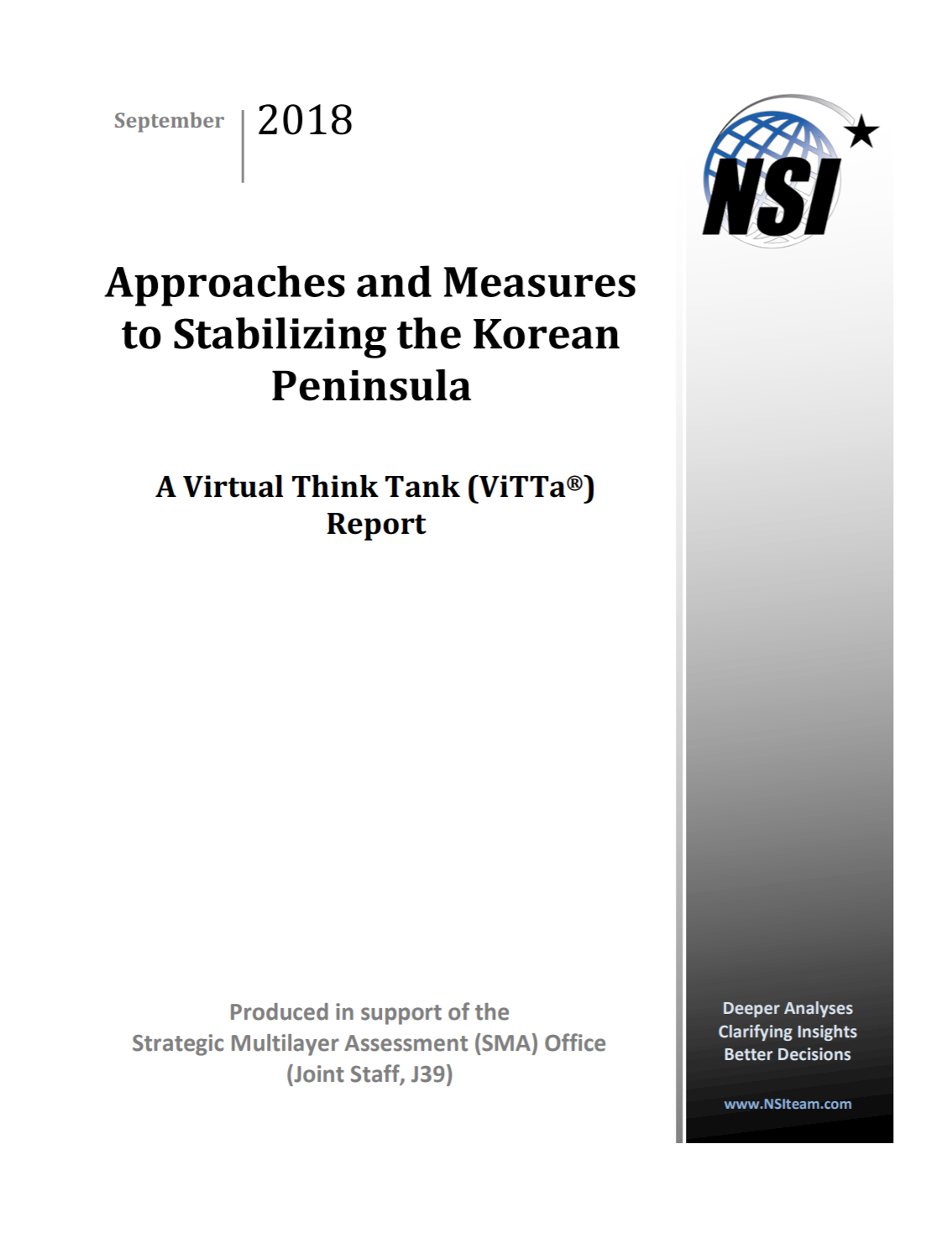Approaches and Measures to Stabilizing the Korean Peninsula – A Korea Strategic Outcomes Virtual Think Tank Report

[Q2] Is there anything the US can do to empower the ROK to negotiate a solution that would remove both the nuclear and conventional instabilities on the peninsula?
Authors | Editors: Aviles, W. (NSI, Inc.); Popp, G. (NSI, Inc.)
Summary Response
This report summarizes the input of 18 insightful responses from the Korea Strategic Outcomes Virtual Think Tank (ViTTa) expert contributors. While this summary response presents an overview of the key expert contributor insights, the summary alone cannot fully convey the fine detail of the contributor inputs provided, each of which is worth reading in its entirety. For this report, the expert contributors consider whether there is anything that the US can do to empower the ROK to negotiate a solution that would remove both the nuclear and conventional instabilities on the Korean Peninsula. This summary details the various perspectives that emerge.
Can the US Empower the ROK to Negotiate a Solution?
There is disagreement amongst the contributors as to whether there is anything the US can do to empower the ROK to negotiate a solution that would remove both the nuclear and conventional instabilities on the Korean Peninsula. Many contributors do believe that the US can empower the ROK to implement measures that would remove instabilities on the peninsula. Although Ken Gause of CNA casts doubt on the likelihood of removing Pyongyang’s nuclear and conventional deterrents in the short- to medium-term, contributors who advocate this position generally assess that there are concrete and realistic actions that the US can take to unilaterally empower Seoul in pursuit of stability on the peninsula in the longer-term. Dr. Patrick McEachern of the Wilson Center, however, disagrees, arguing that the ROK lacks leverage and authority and that the US must lead the way: “the US cannot hope to empower the ROK to negotiate a solution…there is no substitute for American leadership.”
Still other contributors, however, fall somewhere between these two positions. Several of these contributors suggest that the US can empower the ROK to act as a mediator between the US and the DPRK, enabling the ROK to engage in “shuttle diplomacy” in pursuit of solutions that could remove instabilities on the peninsula. Some advocate for a stronger role for Seoul overall, arguing that the US should encourage the ROK to take the lead on negotiating a formal end to war with Pyongyang. Several others are a bit more particular, arguing that the US should lead negotiations related to denuclearization while the ROK should lead conventional détente efforts.
Ultimately, the contributors offer several different approaches that may enable the US to empower the ROK to negotiate solutions that would remove instability on the Korean Peninsula, highlighting different mechanisms for resolving the peninsula’s distinct nuclear and conventional dilemmas.
Denuclearization Measures
Several contributors suggest that removing nuclear threats on the peninsula may be more straightforward than removing conventional instabilities. Dr. Bruce Bennet of RAND and Dr. Jeffrey Knopf of the Middlebury Institute of International Studies echo this assertion, contending that simply holding the DPRK to the Panmunjom Declaration will go a long way toward eliminating nuclear instabilities. Dr. Gary Samore of Harvard University and Brig Gen Rob Spalding of the United States Air Force advocate for a more aggressive approach, arguing that the US should maintain its extended nuclear deterrence regime with Seoul. McEachern suggests that the ROK recognizes the US as the more appropriate actor to lead denuclearization negotiations, and that President Moon “has prioritized communication” with Washington to ensure robust correspondence. On the other hand, Yun Sun of the Stimson Center believes that the US should facilitate the ROK to “push for a nuclear-free, permanently neutral peninsula,” by allowing the ROK to take the lead on some aspect of denuclearization negotiations. Along these lines, Debra Decker of the Stimson Center proposes that the US utilize track 1.5 diplomacy to express an openness to denuclearization negotiations with the ROK, and suggests that Seoul assist Pyongyang in finishing the KEDO nuclear plants to make discussions with the US more attractive.
Conventional Measures
The path to removing conventional instabilities appears to be more complicated and nuanced than denuclearization measures, according to the contributors, and requires significant commitments from the US, ROK, and DPRK. To this end, however, the US may be able to empower the ROK on a number of confidence building measures with the DPRK. While Dr. Miles Yu of the United States Naval Academy argues that the US must never yield its military presence on the Korean Peninsula, other contributors contend that a gradual and reciprocal de-escalation and repositioning of US forces may help to remove conventional instabilities. These contributors identify several potential approaches for overcoming some of the conventional instabilities stemming from the presence of US forces on the peninsula, including:
- Creating a DMZ Peace Zone.
- Establishing a leader-level hotline.
- Considering limits on conventional forces.
- Engaging in negotiations on the reduction of artillery.
- Considering the elimination of elements of ROK missile program activities in exchange for significant reductions in and limitations on the DPRK missile arsenal.
- Expanding the suspension of loudspeaker broadcasts.
- Establishing inter-Korean agreements of conduct in the West Sea.
General Measures
Contributors also highlight several more general approaches to empowering the ROK to negotiate solutions that would abolish instabilities indistinct from conventional and nuclear measures. First, Dr. Steve Sin of the National Consortium for the Study of Terrorism and Responses to Terrorism argues that the ROK must feel that it is leading the discussion and that future policies must “look, taste, smell, and feel Korean,” even if such policies run counter to US interests. In this vein, Dr. John Plumb of RAND suggests that transferring the operational control of Combined Forces Command to the ROK may better empower Seoul to negotiate. Yu, however, warns against ceding such authority to potentially “trigger happy” South Korean leaders. Second, Dr. Gregory Kulacki of the Union of Concerned Scientists highlights the importance of communication, arguing that “the source of all instability is lack of communication and the misunderstanding that results from it.” He suggests, therefore, that “the US should encourage greater ROK communication with the DPRK by engaging in greater communication itself.” Third, several contributors suggest that the US offer a cautious stream of economic benefits both unilaterally and through the ROK to Pyongyang in return for verifiable limits and to increase confidence in negotiations. Lastly, Plumb recommends that the US apply pressure on Seoul to cease reunification rhetoric, contending that it is overtly “unrealistic and unhelpfully aggressive militaristic” and that a message of “brotherhood and harmony” is much more productive.
Subject Matter Expert Contributors
Dr. Bruce Bennet, RAND; Debra Decker, Stimson Center; Abraham Denmark, Wilson Center; Ken Gause, CNA; Dr. James Hoare, Chatham House; Dr. Jeffrey Knopf, Middlebury Institute of International Studies; Dr. Gregory Kulacki, Union of Concerned Scientists; Inhyok Kwon, RAND; Group Captain (Indian Air Force ret) Ajey Lele, Institute for Defence Studies and Analyses; Dr. Rod Lyon, Australian Strategic Policy Institute; Dr. Patrick McEachern, Wilson Center; Dr. John Plumb, RAND; Joshua Pollack, Middlebury Institute of International Studies; Dr. Gary Samore, Harvard University; Dr. Steve Sin, National Consortium for the Study of Terrorism and Responses to Terrorism; Brig Gen Rob Spalding, United States Air Force; Yun Sun, Stimson Center; Dr. Miles Yu, United States Naval Academy.

Comments